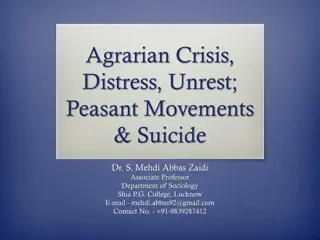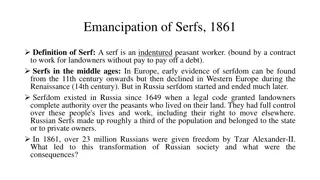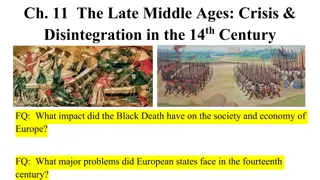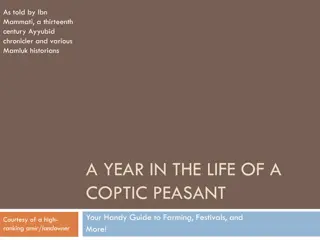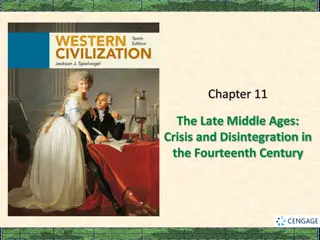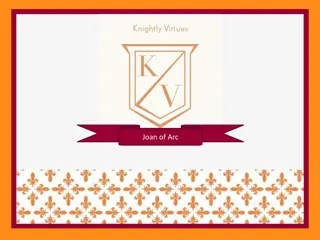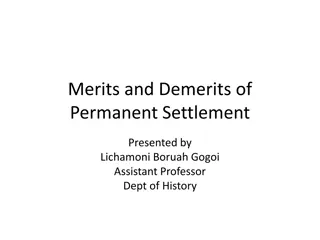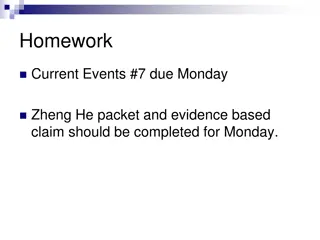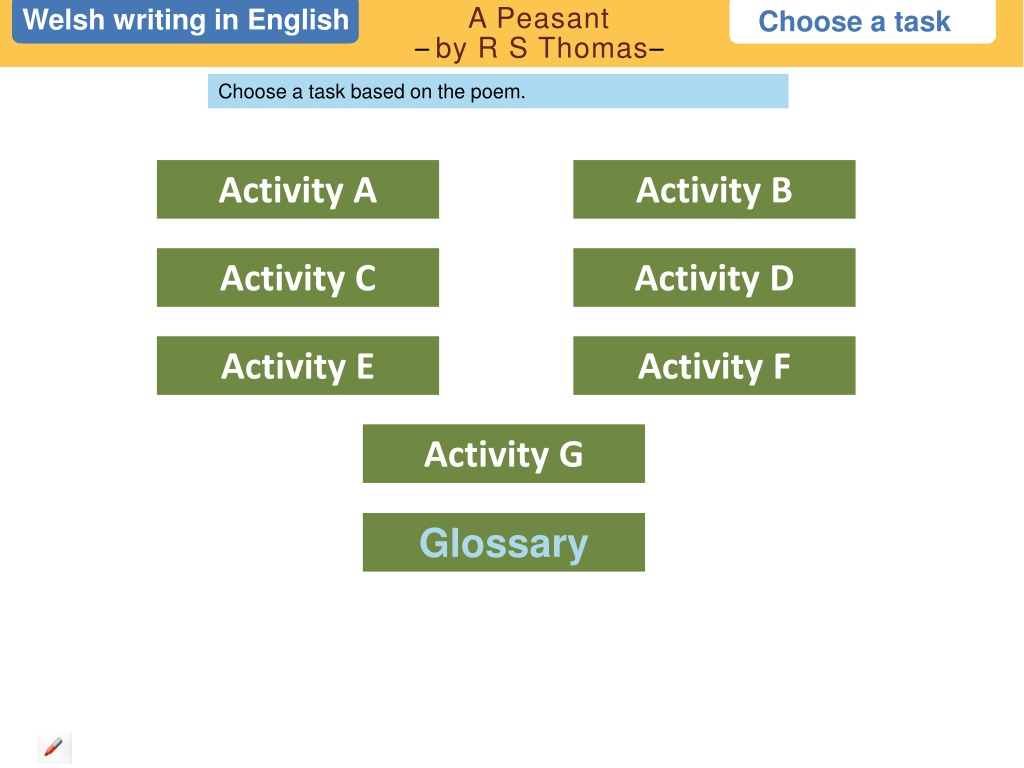
Analysis of "A Peasant" by R.S. Thomas - Welsh Poem Discussion
Explore the portrayal of the peasant in R.S. Thomas' poem "A Peasant" through activities A and B. Understand the contrasting tones, the use of language, and the focus on humanity in this single-stanza piece. Delve into the structure and pronouns used to decipher the intended audience and themes within the poem.
Download Presentation

Please find below an Image/Link to download the presentation.
The content on the website is provided AS IS for your information and personal use only. It may not be sold, licensed, or shared on other websites without obtaining consent from the author. Download presentation by click this link. If you encounter any issues during the download, it is possible that the publisher has removed the file from their server.
E N D
Presentation Transcript
A Peasant by R S Thomas Welsh writing in English Welsh writing in English Choose a task Choose a task based on the poem. Activity A Activity B Activity A Activity B Activity C Activity D Activity C Activity D Activity E Activity F Activity E Activity F Activity G Activity G Glossary Glossary
A Peasant by R S Thomas Activity A Welsh writing in English Welsh writing in English Menu Menu Highlight in red any words which might suggest the peasant is presented in a negative way. Highlight in green any words which might suggest the peasant is presented in a positive way. Iago Prytherch his name, though, be it allowed, Just an ordinary man of the bald Welsh hills, Who pens a few sheep in a gap of cloud. Docking mangels, chipping the green skin From the yellow bones with a half-witted grin Of satisfaction, or churning the crude earth To a stiff sea of clouds that glint in the wind So are his days spent, his spittled mirth Rarer than the sun that cracks the cheeks Of the gaunt sky perhaps once in a week. And then at night see him fixed in his chair Motionless, except when he leans to gob in the fire. There is something frightening in the vacancy of his mind. His clothes, sour with years of sweat And animal contact, shock the refined, But affected, sense with their stark naturalness. Yet this is your prototype, who, season by season Against siege of rain and the wind s attrition, Preserves his stock, an impregnable fortress Not to be stormed even in death s confusion. Remember him, then, for he, too, is a winner of wars, Enduring like a tree under the curious stars. Enduring like a tree under the curious stars. Iago Prytherch his name, though, be it allowed, Just an ordinary man of the bald Welsh hills, Who pens a few sheep in a gap of cloud. Docking mangels, chipping the green skin From the yellow bones with a half-witted grin Of satisfaction, or churning the crude earth To a stiff sea of clouds that glint in the wind So are his days spent, his spittled mirth Rarer than the sun that cracks the cheeks Of the gaunt sky perhaps once in a week. And then at night see him fixed in his chair Motionless, except when he leans to gob in the fire. There is something frightening in the vacancy of his mind. His clothes, sour with years of sweat And animal contact, shock the refined, But affected, sense with their stark naturalness. Yet this is your prototype, who, season by season Against siege of rain and the wind s attrition, Preserves his stock, an impregnable fortress Not to be stormed even in death s confusion. Remember him, then, for he, too, is a winner of wars, How far does this help you identify any structure in the poem, which is a single stanza? Is there any contradiction or tension between ordinary (line 2) and the last 6 lines of the poem? Is there a change in the style of language used in the first 16 lines compared with the last 6 lines? If so, why might this be? Click to show highlighted words.
A Peasant by R S Thomas Activity B Welsh writing in English Welsh writing in English Menu Menu Highlight the pronouns and possessive determiners referring to humans, for example he and his. What does this reveal about the main focus of the poem, and who the poem is addressed to? Iago Prytherch his name, though, be it allowed, Just an ordinary man of the bald Welsh hills, Who pens a few sheep in a gap of cloud. Docking mangels, chipping the green skin From the yellow bones with a half-witted grin Of satisfaction, or churning the crude earth To a stiff sea of clouds that glint in the wind So are his days spent, his spittled mirth Rarer than the sun that cracks the cheeks Of the gaunt sky perhaps once in a week. And then at night see him fixed in his chair Motionless, except when he leans to gob in the fire. There is something frightening in the vacancy of his mind. His clothes, sour with years of sweat And animal contact, shock the refined, But affected, sense with their stark naturalness. Yet this is your prototype, who, season by season Against siege of rain and the wind s attrition, Preserves his stock, an impregnable fortress Not to be stormed even in death s confusion. Remember him, then, for he, too, is a winner of wars, Enduring like a tree under the curious stars Enduring like a tree under the curious stars. Iago Prytherch his name, though, be it allowed, Just an ordinary man of the bald Welsh hills, Who pens a few sheep in a gap of cloud. Docking mangels, chipping the green skin From the yellow bones with a half-witted grin Of satisfaction, or churning the crude earth To a stiff sea of clouds that glint in the wind So are his days spent, his spittled mirth Rarer than the sun that cracks the cheeks Of the gaunt sky perhaps once in a week. And then at night see him fixed in his chair Motionless, except when he leans to gob in the fire. There is something frightening in the vacancy of his mind. His clothes, sour with years of sweat And animal contact, shock the refined, But affected, sense with their stark naturalness. Yet this is your prototype, who, season by season Against siege of rain and the wind s attrition, Preserves his stock, an impregnable fortress Not to be stormed even in death s confusion. Remember him, then, for he, too, is a winner of wars, Who do you think is being addressed in this poem? What is the effect of the single use of the second person after consistent use of the third person? R. S.Thomas commented: I devised a character called Iago Prytherch an amalgam of some farmers I used to see at work on the Montgomeryshire hillsides. Click to show pronouns and possessive determiners.
A Peasant by R S Thomas Activity C Welsh writing in English Welsh writing in English Menu Menu Choose one or two of the highlighted groups of words which you find most powerful. Identify the poetic technique, and then explore the quality of language which helped you make your choice. Iago Prytherch his name, though, be it allowed, Just an ordinary man of the bald Welsh hills, Who pens a few sheep in a gap of cloud. Docking mangels, chipping the green skin From the yellow bones with a half-witted grin Of satisfaction, or churning the crude earth To a stiff sea of clouds that glint in the wind So are his days spent, his spittled mirth Rarer than the sun that cracks the cheeks Of the gaunt sky perhaps once in a week. And then at night see him fixed in his chair Motionless, except when he leans to gob in the fire. There is something frightening in the vacancy of his mind. His clothes, sour with years of sweat And animal contact, shock the refined, But affected, sense with their stark naturalness. Yet this is your prototype, who, season by season Against siege of rain and the wind s attrition, Preserves his stock, an impregnable fortress Not to be stormed even in death s confusion. Remember him, then, for he, too, is a winner of wars, Enduring like a tree under the curious stars. metaphor What does your chosen image reveal about the quality of the landscape and/or the character of the farmer? metaphor metaphor Click to show poetic techniques. metaphor metaphor simile
A Peasant by R S Thomas Activity D Welsh writing in English Welsh writing in English Menu Menu As you read the first sixteen lines of the poem, do you find yourself accepting or reacting against the way the hill farmer is presented? Why? Iago Prytherch his name, though, be it allowed, Just an ordinary man of the bald Welsh hills, Who pens a few sheep in a gap of cloud. Docking mangels, chipping the green skin From the yellow bones with a half-witted grin Of satisfaction, or churning the crude earth To a stiff sea of clouds that glint in the wind So are his days spent, his spittled mirth Rarer than the sun that cracks the cheeks Of the gaunt sky perhaps once in a week. And then at night see him fixed in his chair Motionless, except when he leans to gob in the fire. There is something frightening in the vacancy of his mind. His clothes, sour with years of sweat And animal contact, shock the refined, But affected, sense with their stark naturalness. Yet this is your prototype, who, season by season Against siege of rain and the wind s attrition, Preserves his stock, an impregnable fortress Not to be stormed even in death s confusion. Remember him, then, for he, too, is a winner of wars, Enduring like a tree under the curious stars. What do you see as the main cause of any tension between poet and farmer? Could the words refined and affected also apply to some of the readers the poet is addressing ( your prototype line 17)? Are some readers potentially being challenged about their attitudes to the hill farmer?
A Peasant by R S Thomas Activity E Welsh writing in English Welsh writing in English Menu Menu Choose a word which for you sums up R. S. Thomas s attitude to the hill farmer. admiring, celebratory, depressed, disgusted, matter-of-fact, mocking, patronising, realistic Iago Prytherch his name, though, be it allowed, Just an ordinary man of the bald Welsh hills, Who pens a few sheep in a gap of cloud. Docking mangels, chipping the green skin From the yellow bones with a half-witted grin Of satisfaction, or churning the crude earth To a stiff sea of clouds that glint in the wind So are his days spent, his spittled mirth Rarer than the sun that cracks the cheeks Of the gaunt sky perhaps once in a week. And then at night see him fixed in his chair Motionless, except when he leans to gob in the fire. There is something frightening in the vacancy of his mind. His clothes, sour with years of sweat And animal contact, shock the refined, But affected, sense with their stark naturalness. Yet this is your prototype, who, season by season Against siege of rain and the wind s attrition, Preserves his stock, an impregnable fortress Not to be stormed even in death s confusion. Remember him, then, for he, too, is a winner of wars, Enduring like a tree under the curious stars. Are any of these words close to your interpretation? Click to show words. You may decide your own group s choices reflect the attitudes in the poem better and that more words are needed to convey some of the complexity in the poet s presentation of the hill farmer. In another poem, R. S. Thomas denies he is either making fun of Iago Prytherch or pitying him. Do you think his denial is justified in both cases? Show poem.
A Peasant by R S Thomas Activity F Welsh writing in English Welsh writing in English Menu Menu Identify any use of rhyme, half-rhyme, assonance, eye rhyme or absence of rhyme in the poem. Iago Prytherch his name, though, be it allowed, Just an ordinary man of the bald Welsh hills, Who pens a few sheep in a gap of cloud. Docking mangels, chipping the green skin From the yellow bones with a half-witted grin Of satisfaction, or churning the crude earth To a stiff sea of clouds that glint in the wind So are his days spent, his spittled mirth Rarer than the sun that cracks the cheeks Of the gaunt sky perhaps once in a week. And then at night see him fixed in his chair Motionless, except when he leans to gob in the fire. There is something frightening in the vacancy of his mind. His clothes, sour with years of sweat And animal contact, shock the refined, But affected, sense with their stark naturalness. Yet this is your prototype, who, season by season Against siege of rain and the wind s attrition, Preserves his stock, an impregnable fortress Not to be stormed even in death s confusion. Remember him, then, for he, too, is a winner of wars, Enduring like a tree under the curious stars. Either select one example to comment on, or comment on the overall effect of the use of rhyme in the poem. Click to show shading.
A Peasant by R S Thomas Activity G Welsh writing in English Welsh writing in English Menu Consider the title in relation to the poem as a whole. Do you think it is a) deliberately provocative; b) unintentionally provocative; c) consciously introducing this hill farmer in the context of a tradition of hard-working (peasant) farmers? Menu Iago Prytherch his name, though, be it allowed, Just an ordinary man of the bald Welsh hills, Who pens a few sheep in a gap of cloud. Docking mangels, chipping the green skin From the yellow bones with a half-witted grin Of satisfaction, or churning the crude earth To a stiff sea of clouds that glint in the wind So are his days spent, his spittled mirth Rarer than the sun that cracks the cheeks Of the gaunt sky perhaps once in a week. And then at night see him fixed in his chair Motionless, except when he leans to gob in the fire. There is something frightening in the vacancy of his mind. His clothes, sour with years of sweat And animal contact, shock the refined, But affected, sense with their stark naturalness. Yet this is your prototype, who, season by season Against siege of rain and the wind s attrition, Preserves his stock, an impregnable fortress Not to be stormed even in death s confusion. Remember him, then, for he, too, is a winner of wars, Enduring like a tree under the curious stars. What other interpretation might explain R. S. Thomas s choice of title? Does reading other poems by and about Iago Prytherch affect your view? If so, how?
A Peasant by R S Thomas Glossary Welsh writing in English Welsh writing in English Click on the highlighted words to show their meaning Menu Menu A Peasant Iago Prytherch his name, though, be it allowed, Just an ordinary man of the bald Welsh hills, Who pens a few sheep in a gap of cloud. Docking mangels, chipping the green skin From the yellow bones with a half-witted grin Of satisfaction, or churning the crude earth To a stiff sea of clouds that glint in the wind So are his days spent, his spittled mirth Rarer than the sun that cracks the cheeks Of the gaunt sky perhaps once in a week. And then at night see him fixed in his chair Motionless, except when he leans to gob in the fire. There is something frightening in the vacancy of his mind. His clothes, sour with years of sweat And animal contact, shock the refined, But affected, sense with their stark naturalness. Yet this is your prototype, who, season by season Against siege of rain and the wind s attrition, Preserves his stock, an impregnable fortress Not to be stormed even in death s confusion. Remember him, then, for he, too, is a winner of wars, Enduring like a tree under the curious stars. puts (the sheep) in an enclosure variety of beet used as cattle feed cutting off part of (the mangels) (here) ploughing laughter empty and lonely over-respectable, bourgeois, pretentious or emotionally stirred well-mannered, very polite plain, unembellished original from which copies are made relentless wearing down undefeatable livestock; ancestry

